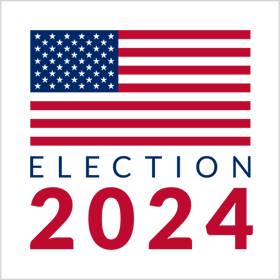US PRESIDENTIAL ELECTIONS 2024
The 2024 U.S. presidential election is one of the most closely watched events in recent history, continuing a trend of intense political interest and high voter engagement that has defined recent American elections. This election pits President Joe Biden, the incumbent Democratic candidate, against former President Donald Trump, who represents the Republican Party. Both candidates bring extensive political experience, but their campaigns reflect starkly different visions for America’s future.
Major Issues Shaping the Election
The 2024 election has been dominated by pressing national and global issues, including economic recovery, healthcare, foreign policy, and climate change. The economy remains a key concern for many Americans as inflationary pressures, interest rates, and employment rates impact households across the country. Biden’s economic policies focus on protecting middle- and working-class families and investing in infrastructure, green energy, and technological development. Conversely, Trump has emphasized lowering taxes, reducing regulation, and promoting American businesses, often contrasting his economic track record with recent challenges.
Healthcare remains a contentious issue, as Biden's administration aims to expand access through measures like increasing Affordable Care Act subsidies, while Trump and Republican candidates argue for reforming and decentralizing federal healthcare involvement. Additionally, foreign policy and international relations are a focal point; the Biden administration has pursued multilateral alliances to counter China and Russia’s influence, while Trump argues for a more nationalist, “America First†approach, promising to reduce military commitments overseas.
The Importance of Swing States
Swing states such as Pennsylvania, Michigan, Wisconsin, Arizona, and Georgia are once again playing crucial roles. These states have historically been decided by narrow margins and could determine the outcome of the election. Campaign efforts have been heavily concentrated in these regions, with both candidates working to sway independent voters and secure turnout from their base. Voter registration and early voting data are closely monitored to predict the outcome, as slight shifts in turnout and support can swing the results in these battleground areas.
Role of the Youth and Diverse Electorate
The electorate in 2024 is more diverse than ever before. Young voters and communities of color, particularly Black and Latino voters, are projected to have a significant impact. For Democrats, mobilizing these groups is essential to counterbalance Republican efforts to appeal to more conservative and rural voters. Social issues, such as reproductive rights, racial justice, and climate policy, resonate deeply with young voters, who have shown strong turnout in recent years.
Concerns Over Election Integrity and Misinformation
With heightened public awareness about election security, officials are focused on ensuring a transparent and secure election. Issues such as voter access, mail-in voting, and the potential spread of misinformation are top of mind. State and federal agencies, in cooperation with social media companies, have implemented strict measures to prevent the spread of false information, aiming to build public trust in the electoral process. Nonetheless, concerns about misinformation persist, particularly regarding voting procedures and results.
Outlook and Final Stages
As Election Day approaches, both campaigns are intensifying their final efforts to motivate voters and secure last-minute support. Public debates, rallies, and grassroots campaigning are in full swing as the candidates seek to consolidate their bases and win over undecided voters. The outcome of the 2024 U.S. presidential election will shape the country’s path forward on critical domestic and international issues, reflecting the values and priorities of the American people at this pivotal moment.




No comments yet
Be the first to share your thoughts!